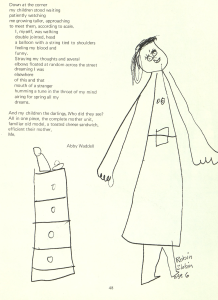
Abby Waddell’s untitled poem was published in Up From Under’s September 1970 issue. This poem describes a woman’s inner self-image, which contrasts that of society and her own children’s image of her.
During the Women’s Liberation Movement, women sought to reclaim their identity beyond their socially-defined role. Before the movement, women were primed to be perfect, ideal mothers. In the editorial statement of Up From Under’s September 1970 issue, the editors explain “childhood and adolescence for a girl is very much a period of training in the basic skills for the job of wife and mother. We are apprentices to our mothers. We learn, willingly or unwillingly, sooner or later, to cook, iron, shop, sew, wash dishes, floors, and clothes and take care of children” (Albert et al.2). Generations of women’s experiences with society’s institutions and expectations have molded this seemingly inescapable model of motherhood. In the September 1970 issue, the editors feature Abby Waddell’s untitled poem, which satirizes society’s model of a perfected motherhood. Waddell describes:
I, myself, was walking
double jointed, head
a balloon with a string tied to shoulders …
And my children the darlings, Who did they see?
All in one piece, the complete mother unit,
Familiar old model, a toasted cheese sandwich,
efficient their mother,
Me (Waddell 48)
Here, Waddell highlights the complexity of motherhood: while outwardly the mother conforms to societal expectations, inwardly she feels completely different. As a mother, she has a duty she is expected to fulfill. According to society’s definition, mothers must efficiently raise the next generation of workers. Because of an expectation for their mother’s efficiency and perfection, children see their mothers “all in one piece, the complete mother unit, familiar old model.” Mothers portray this perfected version of motherhood. As a consequence of this portrayal, they must limit their own personality, which they may never have the opportunity to express. A woman’s children inevitably become her identity. However, through the speaker’s inner thoughts, Waddell recognizes the identity of many women beyond their societally-defined title. Therefore, Waddell and other feminist poets strive to remind women that they are more than mothers. These poets invigorate women to develop beyond their title of mother and explore more freedoms. They argue women can have children, raise them, and enjoy them, but they can also simultaneously develop themselves.
Sources:
Albert, Marilyn, et al., editors. Up From Under, vol. 1, no. 2, 1970, pp. 1–69.
Waddell, Abby. “Untitled.” Up From Under, vol. 1, no. 2, 1970, pp. 48-48.
